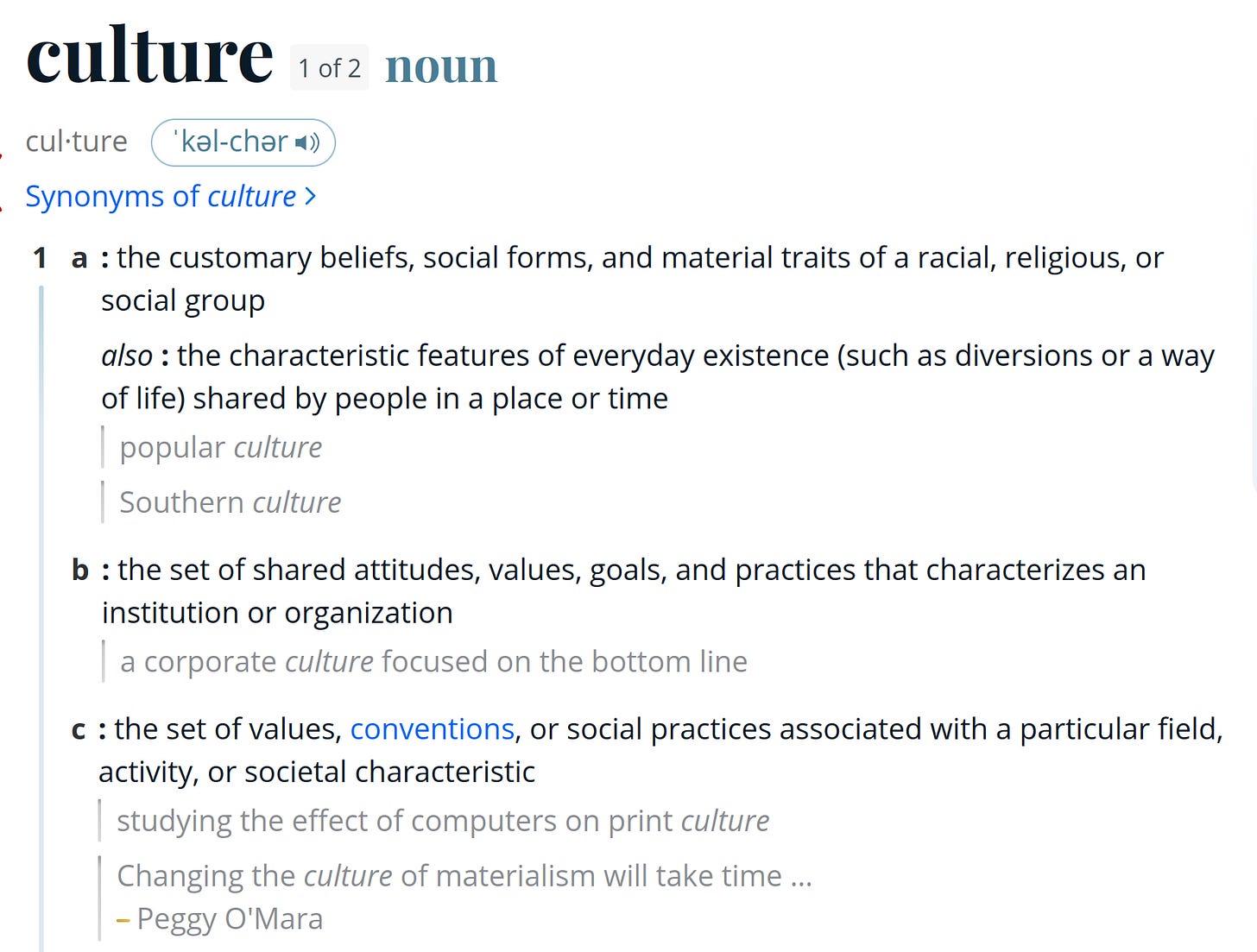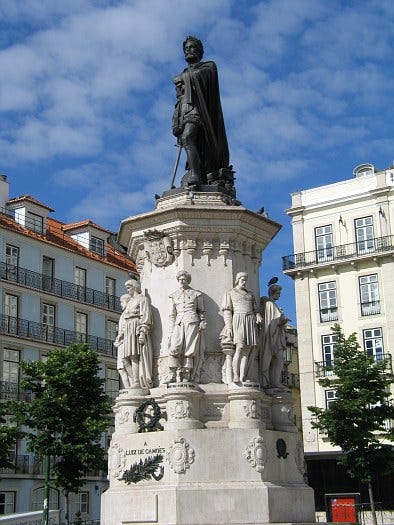Our herd has a culture
but does our country have one?
It was one of the cooler days around here. The skies had been overcast all day and a chilly breeze had made me walk over to right behind the stable, where I didn’t feel it as much. By the evening, the cowboys started a fire in the pit. They cracked a couple of beers, while they were grilling burgers. I wasn’t exactly sitting on their lap, but I could still clearly understand everything they said.
“The Cowboy Festival has been canceled this year,” Jake said.
“Why is that?” Hunter wanted to know.
Jake replied agitatedly: “The County now only wants to fund events that are ‘of cultural essence,’ so they withdrew all support for it.”
“But the reggae festival is still on ?”
“Sure.”
“So why is the reggae festival still on and ours has been axed?”
“Apparently, our way of life is not ‘culture.’ Culture is something only minorities have, they say.”
Jake made air-quote gestures each time he pronounced the word “culture.” He was right to do so, while he didn’t express the question at the root of his argument: what defines the notion of “culture?”
For a long time, most of us would have implicitly understood what is meant by the word “culture,” without the need to reflect upon an exact definition. Many of us still do, but over the course of the last decade, we have been able to observe people from many walks of life struggle with the concept of what it means to adhere to their own culture. It is possible to point to individual sources in which Australians, Brits, or Canadians claim that they do not know what the essence of their own culture is. Today, the question “what does it mean to be British,” which is equivalent to asking what British culture is, is often classified as “a question no one can answer.”

A few decades ago, that question would readily get a lengthy and passionate answer. Some aspects of British culture often cited would have been behavioral, such as being phlegmatic and disciplined, queuing up instead of rushing, or having a soft sense of humour. Beyond behavioral aspects, one would have resorted to lifestyle habits and agricultural products, such as having a pint of bitter and a ploughman’s lunch or fish and chips at the local pub, or having cream tea, depending on one’s personal preferences. Some would certainly have mentioned loftier aspects of British culture too, such as Britain having been the pioneer of the Enlightenment, valuing individual liberties and being a nation that has exported the Industrial Revolution. Others might have added that British culture was predominantly Christian, or that one could only be British if one was born in, or had at least some family lines that could be traced back to, the British Isles.
Not surprisingly, these examples align very well with dictionary definitions of culture. For instance, Merriam Webster defines the term as:

Many of these aspects defining British culture are still very true today. Howbeit, we seem to have ended up in a situation in which some “elites” have so much bought in to the false god of the “multicultural society” that they are unwilling to see that their own nation has a culture worth preserving. This is not only true in Britain. Mainland European circles can be found too who sing tunes along the same vine, such as “elite” Dutch who contend that “the Netherlands does not have a culture.”

I can very easily reject that statement and readily bring up unique aspects of Dutch culture. As opposed to the British, the Dutch are known for their very direct communication style, which many tourists will perceive as “blunt.” They are hard workers and praise moderation: any event that can be summarized as “too much, too long, too copious,” the Dutch will not like. Moreover, they are notorious for eating things that many others would not dare to from the looks of it, such as swallowing raw herring (maatjes), or cheese that is so old and brown that many who were born in other cultures would assume to be rotten. Yet those who have the courage to try those dishes, will be rewarded!
Along the lines of these two examples, it is pretty clear that it does not take too much of an effort to describe what distinguishes British and Dutch cultures and that we can do so in alignment with the dictionary definition of the term. So why exactly are European “elites” so keen on spreading the disinformation that they don’t know what their own culture is? Well, they have been chasing the idol of a “multicultural society” for decades. The failures of that endeavour are more obvious as each day goes by, yet many European “elites” seem incapable to admit to that.
The intention to build a multicultural society may have been good in the beginning. It started in the vein of “let’s bring in some people from far and abroad who do those jobs that are too dirty for us to do ourselves, which keeps the economy humming and, as a side effect, brings some people in who have different cultural habits and whose restaurants we can occasionally patronize.” As long as the latter was the effect, it may have been a transformation for the better indeed. However, all of this was built upon a few silent assumptions. The first is, that those people who arrive and bring a different culture in, do so with positive attitudes and want to contribute to the society in the place they land at. The second is, that there actually is a dominant, domestic culture to which these other groups are willing to act as enriching minorities, all the while aware of their own differences to the lead culture.
Unfortunately, European governments have not been selective at all as to who they let in. Instead, they have started to import jihadis and sharia fanatics, who want to impose their own rule upon the host country. Instead of having a positive mindset, jihadis arrive with the conviction that their new host country needs to be destroyed.
The turning point could have been the Charlie Hebdo shooting. Charlie Hebdo was a French weekly satirical magazine that dared to publish cartoons critical of Mohammed. In response, jihadi gunmen entered their editorial offices in January 2015 and randomly shot employees. Twelve people died in the heinous attack. European authorities could have reacted proportionately to this attack, for instance by reassuring that freedom of speech would always be a core cultural value on the continent, as well as by introducing harsh penalties on jihad and sharia. Such a response would have signaled that Europe would never give in to terrorism.
Instead, Europe has done quite the opposite. Many European countries have reintroduced, reinvigorated, or are considering to reintroduce, blasphemy laws. A good overview is provided by the nonprofit End Blasphemy Laws. While such laws would make blasphemy of any god illegal, it is very much understood that the reason they are being (re)introduced, is to cater to muslim extremists. Even in regions that do not have formal blasphemy laws, people can get convicted for crimes that would otherwise resort under such laws, but nominally for “public order offenses.” This was recently witnessed in England, where a Kursdish-Armenian refugee who had fled islamic hatred in his home country had dared to burn a Quran in front of the Turkish consulate, found himself at first thrown onto the ground and threatened by a knife-wielding radical islamist, only to see himself be convicted of “disturbing the public order,” while the attacker was released on bail.
Jihad and sharia are non-cultures that are completely incompatible with any kind of society. That includes predominantly muslim society. If European “elites” had a grain of common sense, they would have understood this and they would have acted to eradicate those non-cultures. Instead, they have decided to worship the false god of “multiculturalism,” to give in to the whims of terrorists and to plunge their own continent back into the middle ages by nullifying the progress made in the era of Enlightenment.
(If you like the progress made by Wild Horse Wisdom, please consider to subscribe. We have a free tier)
European “elites” are tightly interconnected with supranational organizations, from which many draw their income, often for little to no accomplishment in return. It is therefore understandable that they see national identity as a threat to the trough that feeds them and think that it is a good idea to quash it by allowing massive immigration. In so doing, they are wilfully destroying what makes their own nations unique.
If Western European governments, who implement “elite” agendas, had an inkling of common sense, they would appreciate criticism from within and start a course correction. So far, however, their reaction has been to increasingly label all those who still believe in the uniqueness of their own culture with any epithet du jour associated with one of the totalitarian regimes the continent became infamous for eighty-some years ago, or worse. For instance, the British anti-radicalisation programme creatively named “Prevent” recently stated that concern about mass migration, as we are expressing here, is a “terrorist ideology.” At this point, one should note that Prevent is the same programme that had managed to flag the the Southport stabber for terrorist tendencies, yet had completely failed to actually prevent him from committing the utterly atrocious act of barbarism.* If Prevent stays tolerant to true threats to society, while investing resources in countering the “terror” threat posed by those who still have culture and faith, well then maybe soon the term “terrorist ideolgy” will be coveted as something desirable.
The Merriam-Webster definition of “culture” attests to the existence of a direct link between culture and a certain geographical area in a given time period. For exactly that reason, it turned out to be easy to come up with clear characteristics of British and Dutch cultures above, as well as to point out the differences between them. Culture has ties to a geography, so geographies that have produced a culture need to take an effort to preserve it.
Cultural differences are what enriches a continent. They are also what makes it worthwhile to travel there. We are presently on the cusp of losing cultural richness to the failed construct of “multiculturalism.” We need to turn that around. That can only happen if we recommit to the virtues of the nation-state and curtail the power of any level of supranational structure. Let’s start by abandoning the United Nations, which has over its roughly eighty years of existence never succeeded at its core mission of preventing conflict, yet meanwhile thinks it is entitled to determine what citizens can say.
Abolition of the United Nations should be followed closely by disintegration of the European Union. An immediate positive corollary of that would be that supranational “elites” would return to their home countries from the soulless, endless corridors in Brussels and Strasbourg. Maybe that way they would see that their home country has a culture that differs from Brussels and maybe, just maybe, they would start to recognize again that it is valuable. However, as long as they place their bets on the hollow ideologies of “multiculturalism” and “tolerance” in absurdo, which implies multiculturalism to the point where no culture remains and tolerance for those who lack any tolerance themselves, but no tolerance for those who adhere to the original culture, their own demise is only a matter of time.

Culture is a by-product of a nation’s past endeavours. A common forgotten aspect of how nations came to rise to glory, is that they did so based on faith: a common belief or conviction that the nation and its culture are worthwhile to spread, to preserve and to die for. England, the Natherlands, Portugal and Spain are all nations that succeeded at exporting their culture and values to far and beyond and to areas much larger than the country of origin. Each of these countries engaged in highly risky quests of discovery. In these travels, many ships did not make it back and many sailors and soldies died. Back in the seventeenth century, Portuguese poet Luís de Camões reflected upon if the massive loss of life to discover new territories and spread the gospel was worthwhile. His answer to that question was: “everything is worthwhile if the spirit isn’t too little.” In other words, a nation is built upon faith. American founding fathers can be found to reflect along very similar lines when they were creating the One Nation under God.
Right now, European “elites” have lost all faith. Instead of believing in the projects their own countries and cultures represent, they have reached a state of complete and total moral bankruptcy, maybe best exemplified by their preaching of the false convictions of “multiculturalism” and “decolonization.” It is painful to watch them being unable to see the collateral damages those attitudes produce.
When all of a nation’s forays in the past are portrayed negatively (“decolonization”) and when a nation’s leaders stress the absence of a dominant culture worth preserving (“multiculturalism”), then those who buy in to those assertions will inevitably end up questioning if it is worthwhile to contribute to that society at all. If we believe that all Britain has done is bad, then why would anyone bother to fight and die for it? Moreover, why would anyone pay taxes to a “dark colonial power,” risk one’s life in the police force, or even try to contribute positively to public service? In fact, not unlike tolerance for the jihadi and woke death cults, the false prophecies of multiculturalism and decolonization are a certain road to societal disintegration.
Fortunately, not all is lost. Lack of faith sits at the root of each of these bizarre trends. The recipe to its reversal thusly resides in restoration of faith. All citizens can do their own part, at their own pace. Once a critical mass has been reached, a collective state of awareness will establish itself that can return nations to their erstwhile belief in their own values.
Around here, we are doing what we can to keep our culture alive. If the county doesn’t want to sponsor, so be it. A little after the announcement was made public about the Cowboy Festival’s cancellation, a few wealthy locals stepped in. The festival will now go ahead on private lands, at Z-Hat Ranch. Turns out we don’t need the government after all. We horses have known that all along. Our herd culture does not accommodate the need for a government.



In Britain, being attacked for disapproval of Islam by knife-wielding enraged zealots earns one a conviction for a "racially aggravated public order offense" and life in hiding under continuous threat. All the while, the attacker does not spend a minute in jail. Judges "understand" that the attacker "lost his temper."
"https://www.telegraph.co.uk/news/2025/07/23/koran-burners-appeal-decided-by-pro-free-speech-judge/"
The British government must immediately terminate the limitless tolerance for the intolerant and restore tolerance for civility.
Nations and their societies thrive when there is a common belief that the nation is worth building. Without such faith, society disintegrates, which is exactly what is happening as a consequence of Europe's failed experiment of bowing the knee to jihad in the name of 'multiculturalism.' Without faith, all that is left in Europe's societies is that individuals become slaves to and further enrich the ultra-wealthy, which is a mission that not a single person other than the ultra-wealthy themselves can devote their careers to.